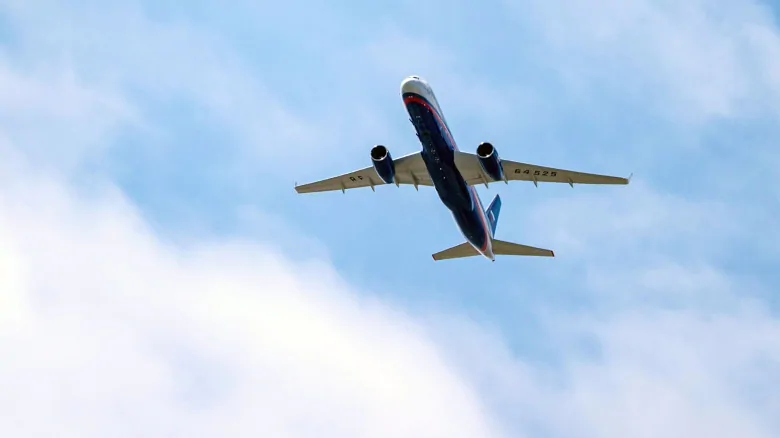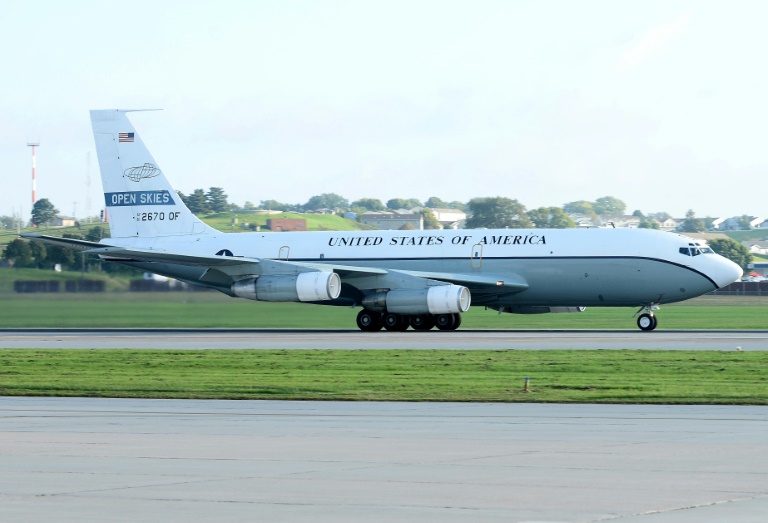
A Russian Air Force Tu-214 flies over Offutt Air Force Base, April 26, 2019. /AP
A Russian Air Force Tu-214 flies over Offutt Air Force Base, April 26, 2019. /AP
Editor's note: Danil Bochkov is an expert with the Russian International Affairs Council. He graduated cum laude with a master's degree in economics from MGIMO-University under the Ministry of Foreign Affairs of Russia and a master's degree in world economy from the University of International Business and Economics in China. The article reflects the author's opinions and not necessarily the views of CGTN.
The U.S. has just announced that it will not rejoin the Open Skies Treaty (OST) placing blame on Russia, which supposedly "damaged" the treaty and failed to "take any actions to return to compliance." It was expected since Joe Biden's administration has demonstrated neither intention nor interest in revisiting it. The Kremlin has expressed disappointment over the decision. Last year Moscow stressed, that its dismantling would cause "less openness, less trust and … security" - so it does.
As Russian Deputy Foreign Minister Sergei Ryabkov outlined, the U.S. had been given enough time to reconsider the "wrong" decision, and should true interest in buttressing the treaty had prevailed – Washington could have rejoined immediately. If one recalls the developments around the New START (Strategic Arms Reduction Treaty) accord, which was almost buried by Donald Trump administration's inaction, Joe Biden – a vocal proponent of its prolongation – prioritized the issue and brought it to the negotiation table with President Vladimir Putin right after his inauguration.
Paradoxically, President Biden was very optimistic about the OST during his presidential campaign saying in May 2020 that by withdrawing from the OST, Donald Trump "has doubled down on his short-sighted policy of going it alone and abandoning American leadership" and disrupted alliances. Commenting on long-existing criticism of Moscow as a spoiler of the treaty's provisions then president-candidate Biden stressed, that the "Russian violations should be addressed not by withdrawing from the Treaty, but by seeking to resolve them" via its thorough implementation.
A lot of other American politicians and security experts from the leading think tanks such as Brookings have spoken up for the OST prolongation as a cornerstone of global security and one of few remaining confidence-building measures. In 2018 then-Defense Secretary Jim Mattis insisted that the treaty was in his country's "best interest." Now the only remaining pillar for keeping the U.S. and Russia from falling into a new arms race is the newly prolonged New START treaty.
The problems around OST arose after 2014, which could be explained by the dramatic nose-diving of U.S.-Russia bilateral relations following the Ukraine crisis. Then the U.S. started blaming Russia for violating provisions of the treaty by refusing flight over some territories such as the Kaliningrad region, which borders several NATO allies.

A U.S. Air Force OC-135 aircraft used for surveillance of Russia under the Open Skies Treaty. /AFP
A U.S. Air Force OC-135 aircraft used for surveillance of Russia under the Open Skies Treaty. /AFP
Some other blockages of U.S. monitoring missions occurred from time to time with Moscow's excuses based on military exercises or travel by important Russian officials. Washington responded by limiting Russian reconnaissance missions over Hawaii and some military bases, as well as confining flights over Alaska and the Aleutian Islands.
Mutual criticism was growing, which resulted in the U.S. decision to withdraw from the treaty in November 2020. It gave Moscow a legal pretext to copy the suit, which followed later in January. On May 19, the Russian lower Parliament voted for denouncing the treaty – a decision that now expects upper Parliament resolution and will proceed to the President for final revision. The timing shows that Russia did not want to scrap the agreement and has been pinning hopes that the U.S. could reconsider – all for vain.
After the U.S. pullout, Moscow was calling on remaining member-states to provide it with written guarantees that no imagery data gathered by other members would be shared with the U.S. NATO allies, including Germany and France, failed to reach compromise within the deadlines set by Moscow by rebuffing Russia legally-bounding conditions. It seems that European treaty signatories did not want to irritate the U.S. and lose their most powerful NATO ally's affection even over security matters. Now some of them regret the U.S. move with Berlin saying that it keeps considering OST an "important element of the arms control architecture."
Within the U.S., strong lobby in U.S. Senate, mostly Republicans, pushed that organizing reconnaissance flights is incomparably expensive with using cutting-edge sensors of the satellites, though other specialists debunk the argument saying that operating, maintaining, and replacing the OC-135B is still cheaper. And those advocating for scraping OST do not consider the fact that not all U.S. allies have enough technological capability to use satellites for this purpose.
However, for U.S. officials in favor of the treaty, they argue that remaining active would provide an opportunity for regular personal exchanges between top military officers, which increases trust and "provides invaluable information" on emotional intelligence level.
Besides, the U.S. benefited more from the treaty using quotas of all its NATO allies to fly over Russia, which accounted for about one-third (with the combination of flights over Belarus) of all flights, while Moscow allocated just 12 percent of its total flyovers for the U.S. territory. Between 2002 and 2016, the U.S. flew 196 times over Russian territory while Russia did with its 71 total flights over the U.S.
Though being crucial for arms control and ensuing trust in the bilateral relationship, the OST seems to have little impact on the Putin-Biden summit planned for June 16, since both sides are too away from moving to trust-building, being more concentrated on repairing the long disrupted relations. Irreversible bury of the treaty would not be beneficial for the overall atmosphere of the meeting, but do not damage it either. Putting arms control aside – both leaders have other pressing issues of mutual and global concern to talk about.
(If you want to contribute and have specific expertise, please contact us at opinions@cgtn.com.)

